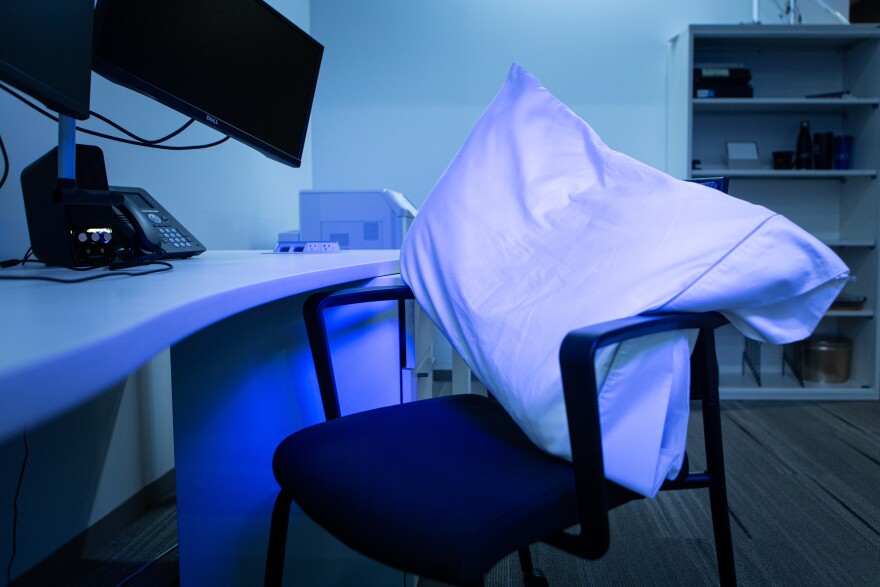Updated September 16, 2025 at 5:00 AM EDT
This story originally published on Jan. 9, 2024, and has been updated.
Sleep has a huge impact on our health. It helps our brains function, protects against heart disease and supports our immune system. And without it, we would die.
But for something so important, we aren't formally taught how to do it right, says Rebecca Robbins, a sleep scientist at Brigham and Women's Hospital and an assistant professor of medicine at Harvard Medical School. "In America, you learn about nutrition or sex ed in school, but never about sleep."
This may be why only a third of Americans get the recommended amount of sleep each night, according to the Centers for Disease Control and Prevention.
To help educate the public about healthy sleep, Robbins and her colleagues identified popular myths about sleep and debunked them in a 2019 paper published in the journal Sleep Health. They looked at statements such as "many adults need only 5 or less hours of sleep" and "it does not matter what time of day you sleep." And they found that these claims had "a limited or questionable evidence base."
Robbins walks through some of these myths with Life Kit and shares some much-needed tips on how to get better sleep.
MYTH 1: It doesn't matter what time of day you sleep
"Unfortunately, the time of day does matter," says Robbin. Our circadian rhythm — the internal circuitry that guides the secretion of the essential sleep hormone melatonin — is "significantly influenced by natural sunlight in our environment."
When the sun comes up and we go outside, that sunshine "stops the floodgates of melatonin and switches the 'on' phase of our circadian rhythm," she says.
"Conversely, going into a dark environment is what allows for the secretion of melatonin," she adds.
Because of the importance of light, individuals who commonly work on overnight schedules or outside the typical 9 to 5 p.m. window can experience health issues, says Robbins. One study published in the journal Occupational Medicine in 2011 found that physicians and nurses who worked during these shifts were more likely to experience an increase in negative health outcomes such as diabetes and breast cancer.
They may be able to get good sleep that supports their health if they are "very diligent about the exposure they get to natural sunlight," she says — for example, avoiding sunlight in their work environment as they approach the end of their shift, wearing sunglasses on the drive home to protect their eyes from the sunrise and sleeping in a room with very thick blackout curtains.
MYTH 2: One night of sleep deprivation will have lasting effects

Your sleep isn't going to be perfect every night, says Robbins. "Every now and then, we might struggle. If we experience some stress during the day, our sleep suffers that night."
Sleep deprivation, or lack of sleep for at least 24 hours, can lead to short-term adverse effects such as a lapse in attention or an increase in resting blood pressure, wrote Robbins and her colleagues in their research paper.
But those effects likely resolve with recovery sleep. So if you have an off night, don't beat yourself up about it, says Robbins. Instead, try to get back on track with your normal sleep schedule as soon as possible.
MYTH 3: Being able to fall asleep anytime, anywhere is a good thing

"It's a myth that a good sleeper would be able to hit the pillow and fall asleep right away," says Robbins. "This is because sleep is a process."
It takes a well-rested, healthy person about 15 to 20 minutes or maybe a little bit longer to fall asleep, she adds.
If you're able to fall asleep immediately, it may be a sign of a chronically sleep-deprived state, wrote Robbins and her colleagues in their study. "If you were starved for food and sat down at any opportunity to eat a huge meal and ate voraciously, that would probably be a sign you're not getting enough nutrition. It's the same thing with sleep."
MYTH 4: You can survive on less than five hours of sleep

Some people brag about needing only a few hours of sleep at night. That may come from the notion in our high-performing society that "well-rested people are lazy," says Robbins — "which is a myth."
The reality is that adults need about seven to nine hours of sleep a night, she says. "That's where we see the most optimal health [outcomes]: improved heart health, longevity and brain health into our older years."
Want to improve your sleep? Sign up for Life Kit's limited-run newsletter Guide to Better Sleep. Over the course of a week, we'll send you science-backed tips on how to sleep longer and deeper. Sign up today.
Sleeping less than seven hours a night can result in weight gain, obesity, diabetes and hypertension, according to a statement from the American Academy of Sleep Medicine and the Sleep Research Society. It's also associated with impaired immune function, impaired performance and increased errors — like "sending an email to the wrong person or entering incorrect numbers in a spreadsheet," says Robbins.
So if you can, try to hit that goal of sleeping seven to nine hours as many nights of the week as possible, she adds. You'll know that you've hit your sweet spot when you "wake up feeling refreshed, have energy throughout the day and are not reaching for coffee or energy drinks in the afternoon."
MYTH 5: Watching TV is a good way to relax before bedtime

Some people like to wind down before bed by watching TV. But that's not a good idea, says Robbins. "You're starting to associate your bed with things other than sleep."
Watching a show on a device that emits heat, like a laptop positioned on your stomach, can also deter your ability to fall asleep. "Keep the body cool as you approach bedtime," she says. Your bedroom should ideally be under 70 degrees. Hotter temperatures can lead to "tossing and turning, sleep disruption and more nightmares."
In addition, watching upsetting programs like the nightly news could cause the stress hormone cortisol to spike in your body and "hinder your ability to power down," she says.
But if watching 20 or 30 minutes of a comforting TV show like Friends or Seinfeld is a big part of your sleep routine and helps you relax before bed, then "carry on," she adds. If your sleep routine "isn't broken, don't worry about fixing it."
MYTH 6: Exercising within four hours of bedtime will disturb your sleep

For many years, sleep experts told people to "avoid exercise close to bedtime," says Robbins, because it can raise body temperature, heart rate and adrenaline levels, leading to poor sleep. "But we actually don't have any good data to back that up."
What the research does show is that exercise and sleep appear "mutually beneficial," wrote Robbins and her colleagues in their paper. One analysis of several research papers found that people who consistently exercised saw "small to moderate improvements in sleep."
"Exercise releases endorphins, which are mood elevators that can help with the No. 1 cause of sleep difficulties: stress," she says.
For that reason, Robbins encourages people to exercise — even if it's close to bedtime. "If that's the only time you can get a workout in, go for it."
The audio portion of this episode was produced by Clare Marie Schneider. The digital story was written by Malaka Gharib and edited by Clare Marie Schneider and Meghan Keane. The visual editor is Beck Harlan. We'd love to hear from you. Leave us a voicemail at 202-216-9823, or email us at LifeKit@npr.org.
Listen to Life Kit on Apple Podcasts and Spotify, and sign up for our newsletter.
Copyright 2025 NPR


